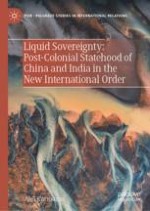2023 | OriginalPaper | Buchkapitel
5. China-Taiwan Relationship
verfasst von : Aleš Karmazin
Erschienen in: Liquid Sovereignty: Post-Colonial Statehood of China and India in the New International Order
Verlag: Springer Nature Switzerland
Aktivieren Sie unsere intelligente Suche, um passende Fachinhalte oder Patente zu finden.
Wählen Sie Textabschnitte aus um mit Künstlicher Intelligenz passenden Patente zu finden. powered by
Markieren Sie Textabschnitte, um KI-gestützt weitere passende Inhalte zu finden. powered by
